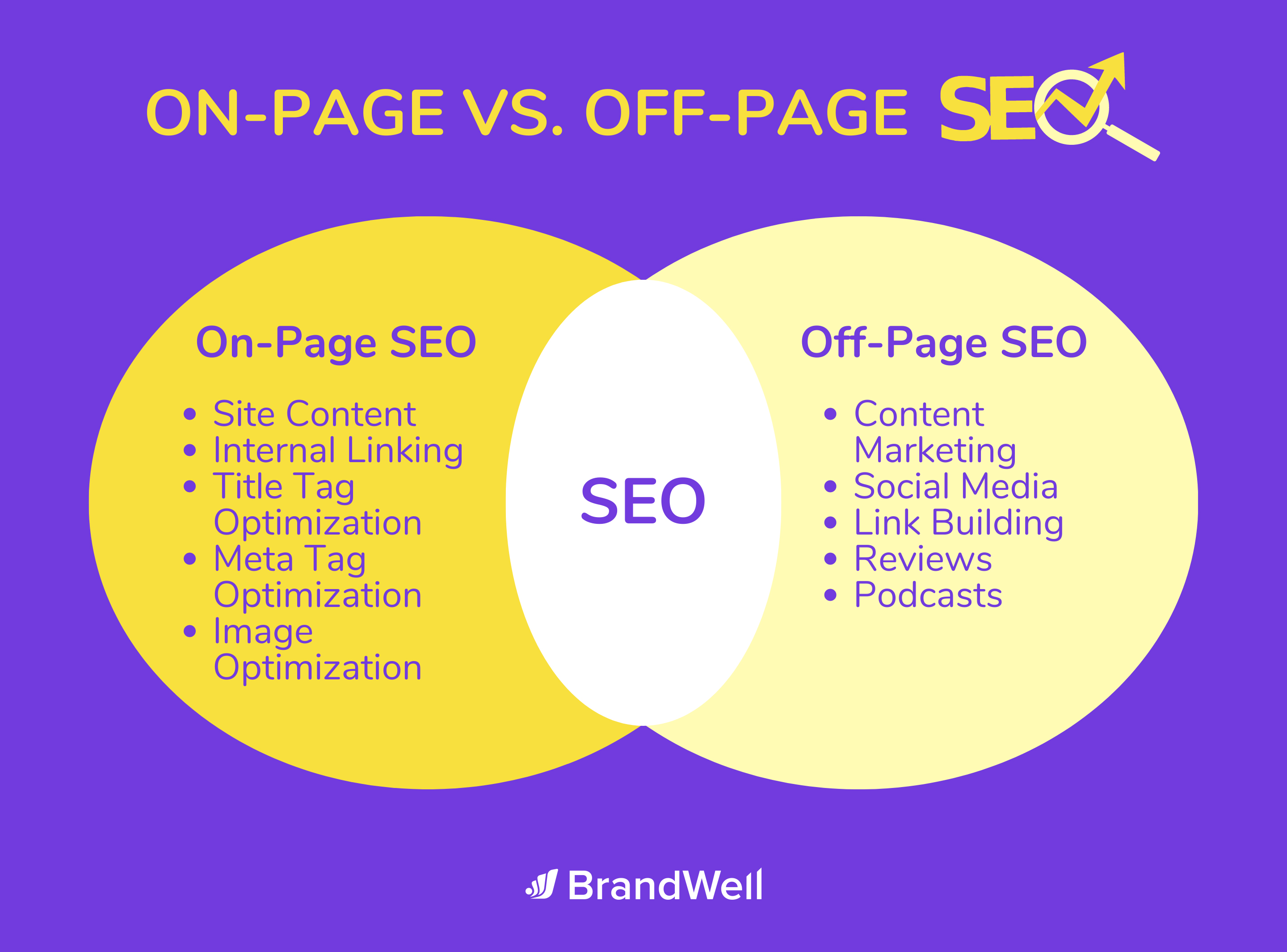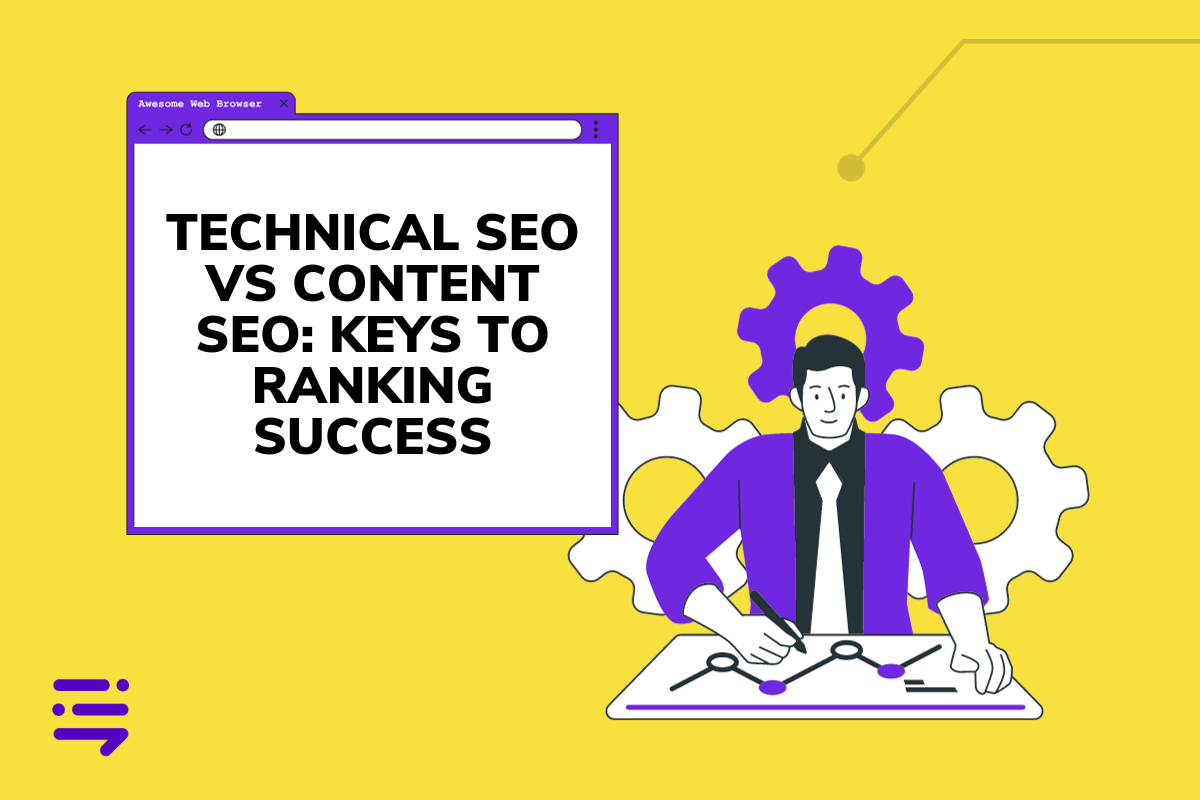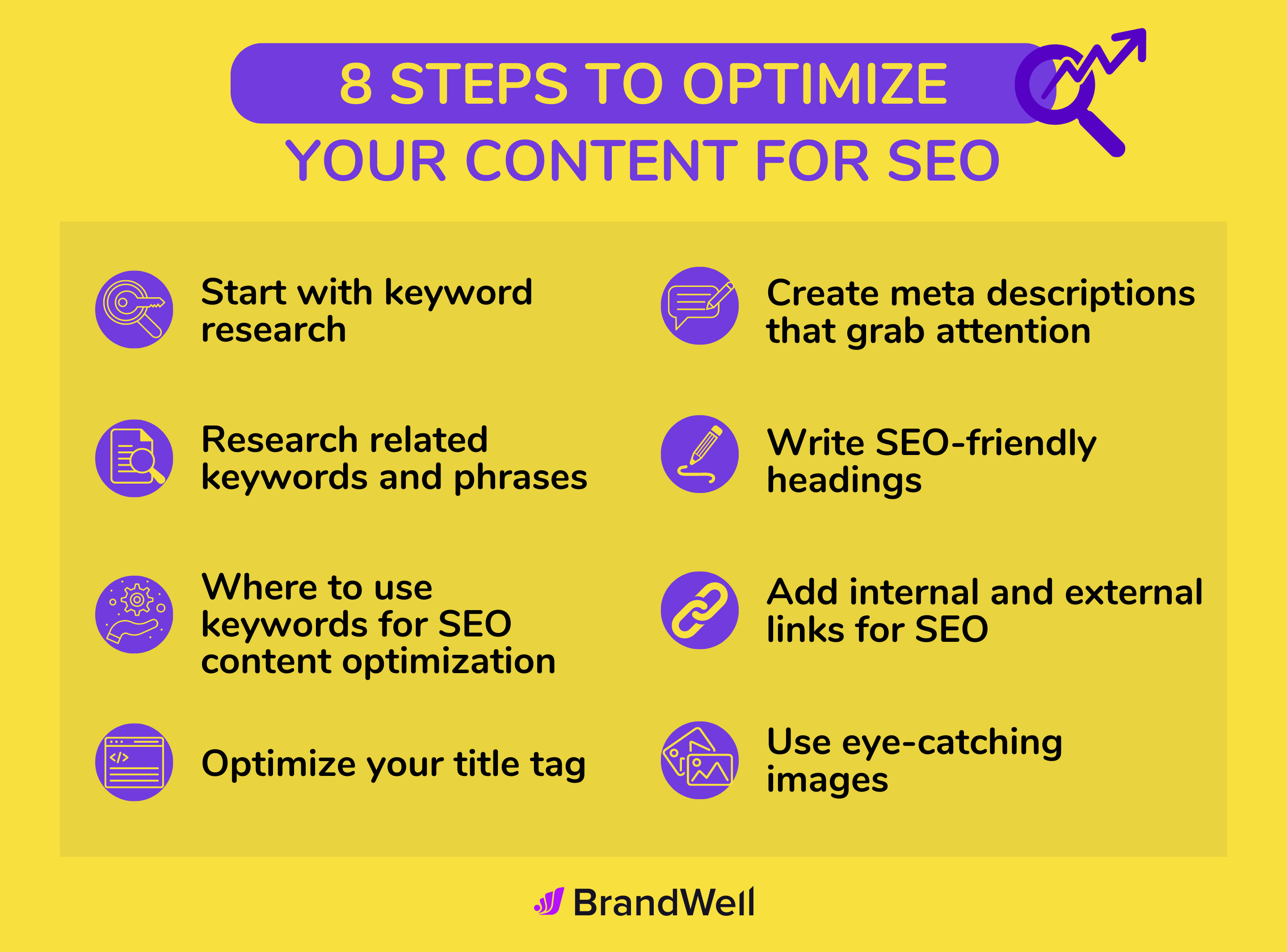Next to keyword research, technical optimization is the most popular SEO tactic. That’s because technical SEO can have a significant effect on a website’s performance in Google search results.
If your page cannot be crawled by search engines, it will not appear on the SERP regardless of its quality and relevance.
And with 59% of all website traffic worldwide coming from mobile phones, the mobile-friendliness and page speed of a website become even more important technical SEO factors. Pages that do not load properly on a small screen create a negative user experience — which may turn off readers and result in poor Google rankings.
This blog post will explain the difference between technical SEO vs content SEO, exploring the unique characteristics of each strategy and how they complement each other to improve your website’s performance.
We’ll break down the intricacies of on-page and technical SEO, identifying common issues you might face with poor technical optimization and best practices to avoid them.
By mastering these elements, you’ll be well-equipped to optimize content for both users and search engines.
Table Of Contents:
- Technical SEO vs Content SEO
- Benefits of Technical SEO
- Technical SEO vs Content SEO: Mistakes to Avoid
- When Should I Focus on Technical SEO or Content SEO?
- Conclusion
Technical SEO vs Content SEO
On-page and off-page SEO strategies are necessary elements in search engine optimization. However, technical SEO is equally important to get your website to climb up the SERPs.
What is Technical SEO?
Technical SEO refers to the behind-the-scenes optimization of your website for search engines. Technical SEO includes a variety of elements that can enhance the function, usability, and presence of your website in search engine results.
Key Components of Technical SEO
To give you an idea of what technical SEO entails, let’s break down some key components:
- Crawlability: Ensure that search engine bots can easily access and crawl through your website’s content.
- Indexing: Make sure your pages are properly indexed by search engines so they appear in relevant searches.
- Sitemaps: Create a clear roadmap for crawlers with XML sitemaps.
- Pagination and canonicalization: Manage duplicate content issues and guide crawlers through your website pages by using canonical tags or pagination attributes like “rel=prev/next”.
- Hreflang tags and internationalization: Optimize multi-language websites using appropriate language tags to serve users the correct version based on their location/language preferences.
Source: Search Engine Journal
What is Content SEO?
Content SEO, on the other hand, focuses on optimizing the actual content on your website for search engines. This includes:
- Descriptive keywords: Incorporate relevant and descriptive keywords into your content to help search engines understand what your page is about.
- Meta descriptions: Write compelling meta descriptions that accurately summarize your content and entice users to click through to your site.
- Create high-quality content: Publish high-quality, informative content that satisfies user search intent and provides value.
- Off-page SEO: Build backlinks and attract social media shares to increase your website’s authority and visibility in search rankings.
Where Do Technical SEO and Content SEO Overlap?
While technical SEO and content SEO may seem like two separate entities, they actually overlap in several key areas:
- Mobile-first indexing: Ensuring your website is optimized for mobile devices is crucial for both technical and content SEO.
- Core web vitals: These technical elements measure website speed, interactivity, and visual stability, which are important for both user experience and search engine rankings.
- Canonical URLs: Properly managing canonical URLs is important for both technical and content SEO to avoid duplicate content issues.
- Product descriptions: Writing high-quality product descriptions that incorporate keywords and provide value is important for both technical and content SEO.
- User experience: Creating a positive user experience through great content and a well-optimized website is important for both technical and content SEO.
Why Does It Matter?
So why should you care about understanding SEO content vs technical SEO?
The answer is simple: because Google does.
A well-optimized website is more likely to rank higher in search results, driving increased organic traffic and conversions. Poor technical SEO or content SEO can lead to a decrease in search engine rankings and traffic.
Technical SEO and content SEO work together to create a strong foundation for your website’s pages. By focusing on both, you can improve your website’s user experience, search engine visibility, and ultimately, your bottom line.

Benefits of Technical SEO
Why should you even bother with technical SEO? Well, it turns out that there are numerous advantages to implementing a comprehensive technical SEO strategy for your website.
Let’s explore these benefits.
Improved Website Performance
A well-optimized site means faster loading times and better user experience (UX). This is crucial because according to Google research, 53% of mobile users abandon sites that take longer than 3 seconds to load.
Higher Search Engine Rankings
No surprise here – proper technical SEO helps search engines crawl and index your site more efficiently, which also helps them understand what it’s about and whether the information you provide is valuable.
This can help your content rank higher in search results, leading to increased visibility and organic traffic.
Better User Experience (UX)
An optimized website not only loads quickly but also offers seamless navigation and accessibility across devices. This means the various types of people browsing your site will have better experiences.
Increased Conversion Rates and Revenue
When your website is optimized for technical SEO, it can lead to increased conversion rates and revenue. This is because a well-optimized site provides a better user experience, which can lead to more engagement and ultimately more sales.
Future-Proofing Your Website
By following technical SEO best practices, you’re ensuring that your site is prepared for any future algorithm updates and changes in search engine guidelines.
Translation: You’ll stay ahead of the competition.
In a nutshell, investing time and effort into technical SEO can significantly improve your website’s performance and user experience, and ultimately boost its visibility in search results.
So, if you want to create high-quality content that ranks well in search engine results pages, it’s important to focus on both content SEO and technical SEO.
This means creating informative content that incorporates descriptive keywords and ensuring that your website’s pages are optimized for core web vitals, site speed, and mobile-first indexing. By doing so, you’ll be able to create a website that Google likes and that provides a great user experience for your audience.

Technical SEO vs Content SEO: Mistakes to Avoid
While both content SEO and technical SEO are important for achieving high search rankings, poor technical SEO can undermine even the best content. On the flip side, even the most perfect example of technical SEO will be wasted if your content isn’t any good.
Here are some common technical SEO and content SEO issues to watch out for.
Common Technical SEO Issues
- Crawl errors: When search engines can’t access or index your site properly, it can hurt your search rankings. Use tools like Google Search Console to identify and fix crawl errors.
- Slow loading speed: Websites that take too long to load can frustrate your audience and hurt your search rankings. Optimize images, enable browser caching, and minify code to improve site speed.
- Broken links: Dead-end links can hurt user experience and search rankings. Use tools like Broken Link Checker to find and fix them.
- Duplicate content: Having the same content on multiple pages can confuse search engines and hurt your search rankings. Use tools like Siteliner or Ahrefs Site Audit to find and resolve duplicate content issues.
- Poor mobile experience: With more than half of web traffic coming from mobile devices, having a responsive design is crucial for both user experience and search rankings. Test your site with Google’s Mobile-Friendly Test.
- Unsafe website: HTTPS is now a ranking factor, so make sure your site has an SSL certificate installed. Check your security status using the free tool SSL Labs Test.
Common Content SEO Issues
- Overly promotional content: Constantly pushing promotional messages can turn off your audience. It’s important to strike a balance between promoting your brand and providing valuable, informative, or entertaining content. Focus on building relationships and providing value to your audience.
- Poor grammar and spelling: Content riddled with grammatical errors and spelling mistakes can make your brand appear unprofessional and careless. It undermines your credibility and can deter potential customers.
- Inconsistent brand voice and tone: Your brand should have a consistent voice and tone across all digital content. Inconsistencies can confuse your audience and dilute your brand’s identity. Ensure your content aligns with your brand values, messaging, and personality.
- Insufficient fact-checking: Publishing content with factual errors or inaccurate information damages your brand’s credibility. Always double-check your content for accuracy and ensure that any claims or statistics are backed by reliable sources.
- Lack of audience understanding: Failing to understand your target audience can lead to content that doesn’t resonate with them. If your content doesn’t address their needs, preferences, or pain points, it will be ineffective and may even alienate your audience.
- Unaccredited content: Using content from external sources without proper accreditation can lead to legal and ethical issues. It’s important to give credit where it’s due and properly attribute any quotes, images, or information that you include in your content. Failure to provide proper accreditation not only violates copyright laws but also undermines your brand’s integrity and can damage relationships with other content creators or industry experts. Always seek permission when necessary and provide clear references or citations for any external content you use.
- Lack of depth: Content that lacks substance or value provides little or no meaningful information to the reader. Thin content not only fails to engage your audience but also ranks poorly in search engine results. It’s important to focus on creating comprehensive and informative content that addresses your audience’s needs and interests.
By addressing these common technical and content SEO issues, you can improve your website’s performance in search engine rankings and ensure that your high-quality content gets the attention it deserves.
Remember, creating great content is only half the battle. Incorporating technical SEO best practices is essential for achieving long-term success in search engine optimization.
When Should I Focus on Technical SEO or Content SEO?
Both technical SEO and content SEO are important for improving your website’s visibility in search engine results. The focus on each depends on the current state of your website and your specific goals.
Here’s a general guideline on understanding SEO content vs technical SEO and when to focus on each aspect.
Focus on technical SEO when:
- You have a new website: In the early stages, it’s crucial to ensure your website is technically optimized for search engines. This includes setting up proper URL structures, optimizing page load speed, implementing XML sitemaps, and making your website mobile-friendly.
- You’re experiencing indexing or crawling issues: If your website pages aren’t being properly indexed or search engines are having trouble crawling your site, technical SEO becomes a priority. Address issues like broken links, duplicate content, or incorrect canonical tags that could hinder search engine bots from effectively crawling and indexing your website.
- Your website performance is subpar: Slow-loading pages, poor user experience, or technical errors can negatively impact your SEO efforts. Address technical issues, optimize your website’s performance, and ensure it provides a seamless experience to users.
Focus on content SEO when:
- Your website has a solid technical foundation: Once your website is technically optimized, you can shift your focus toward creating high-quality content that provides value to your target audience. Develop a content strategy, conduct keyword research, and optimize your content to align with relevant search queries.
- You want to improve organic rankings and visibility: Content plays a crucial role in improving your website’s rankings in search engine results. By creating informative, well-written, and engaging content, you increase the likelihood of attracting organic traffic and generating backlinks, both of which contribute to higher search engine visibility.
- You’re targeting specific keywords or topics: Content SEO is particularly important when you’re aiming to rank for specific keywords or cover certain topics comprehensively. Ensure your content is optimized with relevant keywords, incorporates proper heading structure, includes internal and external links, and provides a great user experience.
Remember that technical SEO and content SEO are interconnected, and it’s an ongoing process. A well-optimized website requires both aspects to work together effectively. Regularly monitor your website’s performance, analyze user behavior, and make adjustments as needed to achieve the best results in search engine rankings and user experience.
Conclusion
Understanding technical SEO vs content SEO is important for successful website optimization. On-page optimization focuses on creating high-quality content that resonates with your audience, while technical SEO ensures that your site is structured in a way that search engines can easily crawl and index.
Implementing best practices for both types of optimization can improve your website’s visibility in search results and attract more organic traffic. Remember to regularly check for common technical issues such as broken links or slow page speed to ensure optimal performance.
Did you know that content SEO is built into the BrandWell app? It’s an AI tool that’s trained to generate blog posts in an instant! Try it today to start creating long-form content.







